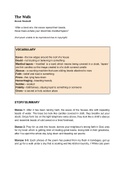The Walk
Derek Walcott
“After a hard rain, the eaves repeat their beads,
those trees exhale your doubt like mantled tapers”
(Full poem unable to be reproduced due to copyright)
VOCABULARY
Eaves - the low edges around the roof of a house
Doubt - not trusting or believing in something
Mantled tapers - ‘mantled’ is a word which means being covered in a cloak, ‘tapers’
are thin candles so the image created is of a cloth covered candle
Abacus - a counting machine that uses sliding beads attached to rows
Faith - belief and trust in something
Prone - flat, lying face down
Hemorrhaging - bleeding heavily
Sodden - soaked
Fidelity - faithfulness, staying loyal to something or someone
Grove - a sacred or holy outdoor place
STORY/SUMMARY
Stanza 1: After it has been raining hard, the eaves of the houses drip with repeating
beads of water. The trees too look like candles covered in cloth, they breathe out your
doubt. Drops form too on the tight telephone wires above, they look like a child’s abacus
and resemble beads of cold sweat on a lined forehead,
Stanza 2: Pray for us and this house, borrow your neighbour’s strong faith in God, pray
for my brain which is getting tired of reading great books, losing faith in their greatness,
after I’ve spent the whole day lying down and bleeding out poems
Stanzas 3-5: Each phrase of the poem has peeled from my flesh in bandages, get up
and go for a walk under a sky that is soaking wet like kitchen laundry, // While cats yawn
, as they sit in the windows of houses, they are lions that choose their own cages, I won’t
walk any further than your neighbour’s gates that are decorated with pearl. How terrible
your own // Faithfulness is. You have a heart like a rose of iron (it is both delicate and
hardened). Now more than ever, your work is like the kind of soppy novel that a
housemaid would read. Only the pain
Stanzas 6-7: the pain is real. Here is the end of your life, a clump of bamboo that looks
like a fist opening as it drops its flowers, a dirt path that hisses through the clump of
trees covered in rain, // abandon everything, the work, the pain, the short life. Shocked,
you move; your house is a lion rising and it paws you back?
SPEAKER/VOICE
It has been suggested that this poem is about Walcott’s relationship with his wife, who
was dying of a sickness. If interpreted in this way, we can view the speaker as Walcott
himself and the poem as autobiographical and personal, describing the relationship
between himself and the addressee, his wife. The poem is intended for a personal,
perhaps private audience, and therefore it shares personal feelings and experiences
which the speaker and addressee have in common - in this case, the process of going
for a short walk together out of the house to the end of their lane and back.
LANGUAGE
Assonance - ‘eaves’, ‘repeat’, ‘beads’ - the first line contains assonance with a long,
drawn out ‘ea’ sound, perhaps to imitate the drawn out suffering of the addressee.
The assonance also imitates the distension of water droplets as they lengthen and
then drop off the edges of the house.
Apostrophe - ‘O heart, O rose of iron!’ - the direct address to the addressee’s heart
has echoes of Ancient Greek poetry to it, which uses an exclamation similar to ‘O’ to
invoke certain deities or spiritual entities, such as the muses which inspire creative
processes. In this sense, the use of apostrophe here could be implying that Walcott
views his wife as a sort of muse. The line also uses synecdoche, referring to the
‘heart’ of the addressee as a way to represent her whole self, her core emotions and





